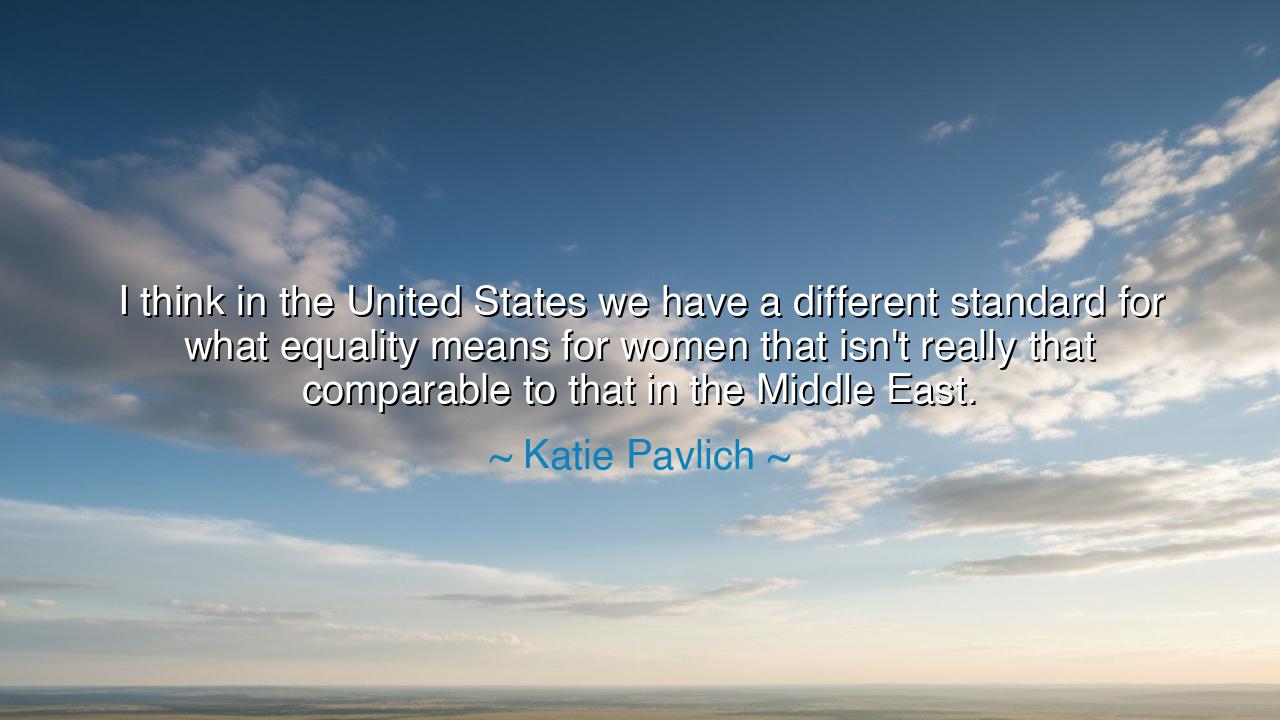
I think in the United States we have a different standard for
I think in the United States we have a different standard for what equality means for women that isn't really that comparable to that in the Middle East.






In the vast expanse of human civilization, the quest for equality has been a constant, though not always consistent, pursuit. The words of Katie Pavlich—"I think in the United States we have a different standard for what equality means for women that isn't really that comparable to that in the Middle East"—invite us to reflect deeply on the differences in how equality is understood and practiced across cultures and societies. Her statement acknowledges that equality for women is a concept that, while celebrated in some parts of the world, is often interpreted in vastly different ways depending on the historical, cultural, and societal contexts.
In the ancient world, the treatment of women varied dramatically across regions. In ancient Greece, for example, women were often relegated to the private sphere, their lives constrained by the expectations of their roles as wives and mothers. Socrates himself, despite his great wisdom, did not challenge the notion that women were secondary to men in many respects. Yet, there were exceptions to this, as we find in the stories of women like Aspasia, the companion of Pericles, who was a highly respected intellectual in her own right. Aspasia defied the norms of her time by participating in intellectual discussions and influencing the political landscape, showing that even in an era where women were not granted full equality, there were those who defied these limitations through courage and wisdom.
However, in the Middle East, as Pavlich alludes to, the situation for women has often been marked by deeply entrenched systems of patriarchy and religious doctrines that have restricted their rights and freedoms. In many parts of the region, gender equality has historically been subordinated to tradition and religious law, creating a vastly different reality for women than what has unfolded in the Western world. For example, in Saudi Arabia, women were not allowed to drive until 2018, and even now, their freedom of movement, participation in public life, and ability to work are still restricted by laws and cultural practices that reflect a system where gender roles are rigidly defined. The contrast between the lives of women in the Middle East and those in the United States highlights the very real disparities in the way equality is understood and applied.
Yet, even in Western societies, the journey toward true gender equality is far from complete. While women in the United States have gained significant ground in areas such as education, employment, and political representation, there still exists a significant gap in wages, opportunities, and societal expectations. Women continue to fight for reproductive rights, equal pay, and freedom from sexual harassment and violence. The gender gap in leadership positions, especially in business and politics, serves as a stark reminder that equality has yet to be fully achieved. Pavlich’s statement points to this unequal standard in the United States, where women may enjoy certain freedoms, yet still face barriers that prevent them from enjoying full equality in many aspects of life.
Take the example of the suffragist movement in the United States, where women fought for decades to win the right to vote. Leaders like Susan B. Anthony and Elizabeth Cady Stanton were pioneers in advocating for women’s rights, believing that political equality was essential for achieving broader social justice. Their struggle, though victorious with the passing of the 19th Amendment in 1920, was just one step in a long fight for true equality. The same can be said of the ongoing struggles faced by women today, as they continue to challenge societal norms and demand the rights to make decisions about their bodies, their careers, and their futures.
The lesson here is that equality is not a static concept—it is a living principle that is shaped by the cultural, social, and political contexts in which it exists. The struggle for women’s rights is not only about achieving legal equality, but also about changing hearts, minds, and cultural perceptions of gender roles. While the United States may have made significant strides in the fight for gender equality, it is important to recognize that the journey is not complete, and that progress is always a continuous struggle. Likewise, women in the Middle East and other parts of the world are engaged in their own battles to achieve the freedom and dignity that should be afforded to all human beings, regardless of gender.
In your own life, consider how you can contribute to the ongoing fight for equality. Whether it is standing up against discrimination, supporting those who are fighting for gender equality, or simply reflecting on how you can change your own beliefs and actions, remember that equality is not a gift given to us, but a right we must actively fight for. Like the great women of history who have faced oppression and fought for their rights, we too must carry the torch forward, ensuring that the future is one where equality is not just an aspiration, but a reality for all. Just as Socrates challenged the beliefs of his time, we too must challenge the inequalities that persist today, ensuring that equality becomes the foundation of a just and flourishing world for future generations.






AAdministratorAdministrator
Welcome, honored guests. Please leave a comment, we will respond soon